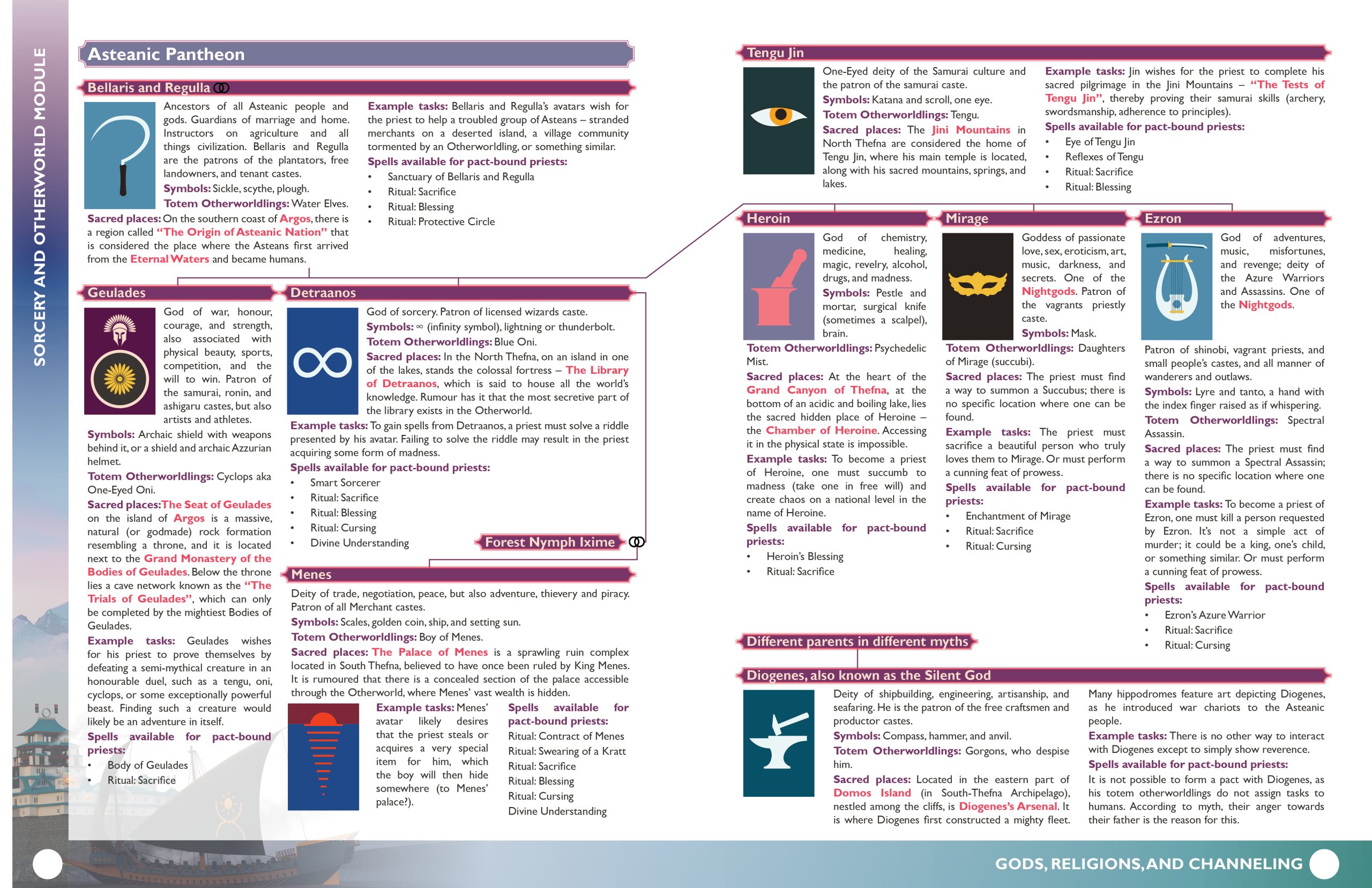In the Asteanic World, there are many gods and various religions.
Gods are divided into two types: major deities and lesser deities.
Major deities are associated with larger, overarching concepts, such as the god of death, the god of trade, the god of the sea, or the god of war. Lesser deities, on the other hand, are either nature gods linked to specific locations, like the god of that lake, forest or swamp, or ancestor-gods associated with specific human groups, such as our tribe’s ancestor god or the ancient god-king of this city, and so on.
Major Deities
Major deities are characterized by their elusive nature to humans. There is no specific place where they reside, no clear understanding of their appearance, and no direct way to communicate with them. Therefore, their nature is largely the domain of theological debates.


Blogpost about The Doctrine of Eternal Waters, also known as the Temple of the Divine Ocean or just Asteanic Polytheism: https://sake.ee/religions-in-the-asteanic-world/
One can make pacts with as many major deities as they wish, as pacts with major deities do not come with any taboos that need to be written on the Character Sheet. To make a pact, one must summon the major deity’s totemic being or visit a sacred place where a major deity’s totemic being resides. The totemic being assigns a task to the priest. These tasks are complex, and completing one task can be a whole adventure.
Lesser Deities
Lesser deities are actual beings in the game to whom the Game Master can assign Health Points, Skills, and Abilities.
All lesser deities belong to a certain deity class or portfolio, which determines the spells that can be acquired by a priest who enters into a pact with them. The classes of lesser deities are wind deities, water deities, forest and earth deities, mountain deities and ancestors.
Establishing a pact with lesser deities necessitates initial contact with them, which can be achieved through a Theology Ritual: Prayer (only effective when the character is in the same region as the deity) or physically seeking out the deity.
To formalize a pact, a priest must fulfil the task assigned by the lesser deity and adhere to the lesser deity’s taboo or principle which has to be written on the Character Sheet. Tasks set by lesser deities are typically less complex than those imposed by major deities.
Priests have the capacity to enter into pacts with up to ten lesser deities, as each new contract requires the adoption of one of the deity’s principles or taboos, and characters can possess a maximum of ten principles and other personality traits.
Playing a Priest
To use priest spells, a PC must purchase the skill: Channelling, which is not initially present on the Character Sheet. Channelling is an Instinct skill.
However, characters can forge contracts with gods without possessing this skill. For instance, if they plan to become a priest later or wish to earn favour with a local nature deity through a contract.
There are two ways to acquire the Channelling skill:
- Purchasing Theology Ritual: Prayer
- Purchasing Self-Powered Spell: Divine Aid
Technically, Channelling works the same way as other magic: the priest selects a spell to cast, makes a Channelling check as indicated in the spell description, and the spell consumes Spellpoints.
Channelling Spells
Priest spells are categorized into three groups, all utilizing the Channelling skill:
The first group consists of Self-Powered spells. These abilities are not specifically linked to any particular deity, meaning they can be acquired even without forming a pact with a god. Characters can attribute increased strength or a more potent strike to a deity, but in reality, it’s their own faith and soul’s energy at work. These spells only affect the priest and do not influence anyone else without additional abilities.

The second group of spells originates from contracts with lesser deities. These spells can influence the external world more realistically than other magic. These contracts are tied to a lesser deity, and the priest channels the world-altering energy of that deity. A priest can form contracts with up to ten lesser deities, but in return, they must perform deeds for the deities and embrace the taboos or principles of those deities. Breaking a lesser deity’s taboo may result in the contract breaking (50% chance). Additionally, it is possible to kill lesser deities, in which case priests lose their spells.

The third group of spells comes from contracts with major deities, which can be made by receiving tasks from and fulfilling them for the major deity’s totemic creature. Spells received from major deities are powerful, and acquiring them requires significant effort to please the deity. Once a contract with a major deity is established, it never breaks.

Additionally, there are theology rituals that do not require the Channelling skill at all.
SAKE Full Book at Kickstarter: LINK




























Leave a Reply